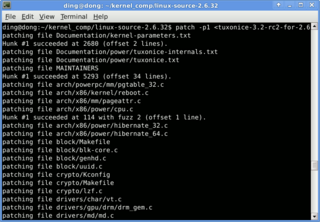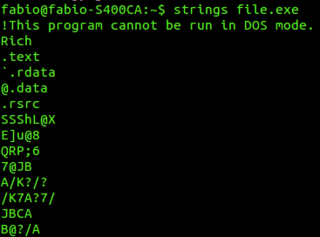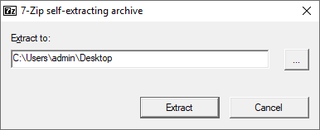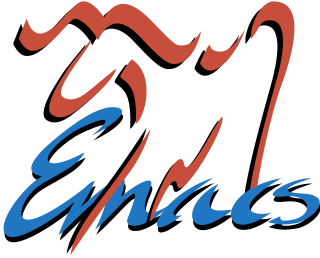GNU Sharutils is a set of utilities to handle shell archives. The GNU shar utility produces a single file out of many files and prepares them[ clarification needed ] for transmission by electronic mail services, for example by converting binary files into plain ASCII text.
A shell archive is a collection of files that can be unpacked by the Bourne shell. A wide range of features provide extensive flexibility in manufacturing shar archives and in specifying shar smartness. For example, shar may compress files, uuencode binary files, split long files and construct multi-part mailings, ensure correct unsharing order, and provide md5sum or byte count verification.
GNU unshar scans a set of mail messages looking for the start of shell archives. It will automatically strip off the mail headers and other introductory text. The archive bodies are then unpacked by a copy of the shell. unshar may also process files containing concatenated shell archives.

Cygwin is a POSIX-compatible programming and runtime environment that runs natively on Microsoft Windows. Under Cygwin, source code designed for Unix-like operating systems may be compiled with minimal modification and executed.
In computing, the utility diff is a data comparison tool that computes and displays the differences between the contents of files. Unlike edit distance notions used for other purposes, diff is line-oriented rather than character-oriented, but it is like Levenshtein distance in that it tries to determine the smallest set of deletions and insertions to create one file from the other. The utility displays the changes in one of several standard formats, such that both humans or computers can parse the changes, and use them for patching.
In computing, tar is a computer software utility for collecting many files into one archive file, often referred to as a tarball, for distribution or backup purposes. The name is derived from "tape archive", as it was originally developed to write data to sequential I/O devices with no file system of their own. The archive data sets created by tar contain various file system parameters, such as name, timestamps, ownership, file-access permissions, and directory organization. POSIX abandoned tar in favor of pax, yet tar sees continued widespread use.
In software development, Make is a build automation tool that automatically builds executable programs and libraries from source code by reading files called Makefiles which specify how to derive the target program. Though integrated development environments and language-specific compiler features can also be used to manage a build process, Make remains widely used, especially in Unix and Unix-like operating systems.
dpkg is the software at the base of the package management system in the free operating system Debian and its numerous derivatives. dpkg is used to install, remove, and provide information about .deb packages.
In the Unix operating system, shar is an archive format created with the Unix shar utility. A shar file is a type of self-extracting archive, because it is a valid shell script, and executing it will recreate the files. To extract the files, only the standard Unix Bourne shell sh is usually required.
uuencoding is a form of binary-to-text encoding that originated in the Unix programs uuencode and uudecode written by Mary Ann Horton at UC Berkeley in 1980, for encoding binary data for transmission in email systems.
MinGW, formerly mingw32, is a free and open source software development environment to create Microsoft Windows applications.
The archiver, also known simply as ar, is a Unix utility that maintains groups of files as a single archive file. Today, ar is generally used only to create and update static library files that the link editor or linker uses and for generating .deb packages for the Debian family; it can be used to create archives for any purpose, but has been largely replaced by tar for purposes other than static libraries. An implementation of ar is included as one of the GNU Binutils.

The computer tool patch is a Unix program that updates text files according to instructions contained in a separate file, called a patch file. The patch file is a text file that consists of a list of differences and is produced by running the related diff program with the original and updated file as arguments. Updating files with patch is often referred to as applying the patch or simply patching the files.
In computing, gettext is an internationalization and localization system commonly used for writing multilingual programs on Unix-like computer operating systems. One of the main benefits of gettext is that it separates programming from translating. The most commonly used implementation of gettext is GNU gettext, released by the GNU Project in 1995. The runtime library is libintl. gettext provides an option to use different strings for any number of plural forms of nouns, but this feature has no support for grammatical gender.

BusyBox is a software suite that provides several Unix utilities in a single executable file. It runs in a variety of POSIX environments such as Linux, Android, and FreeBSD, although many of the tools it provides are designed to work with interfaces provided by the Linux kernel. It was specifically created for embedded operating systems with very limited resources. The authors dubbed it "The Swiss Army knife of Embedded Linux", as the single executable replaces basic functions of more than 300 common commands. It is released as free software under the terms of the GNU General Public License, version 2.
An email attachment is a computer file sent along with an email message. One or more files can be attached to any email message, and be sent along with it to the recipient. This is typically used as a simple method to share documents and images.
cpio is a general file archiver utility and its associated file format. It is primarily installed on Unix-like computer operating systems. The software utility was originally intended as a tape archiving program as part of the Programmer's Workbench (PWB/UNIX), and has been a component of virtually every Unix operating system released thereafter. Its name is derived from the phrase copy in and out, in close description of the program's use of standard input and standard output in its operation.

In computer software, strings is a program in Unix, Plan 9, Inferno, and Unix-like operating systems that finds and prints text strings embedded in binary files such as executables. It can be used on object files and core dumps.

The GNU Binary Utilities, or binutils, are a set of programming tools for creating and managing binary programs, object files, libraries, profile data, and assembly source code.

A self-extracting archive is a computer executable program which contains compressed data in an archive file combined with machine-executable program instructions to extract this information on a compatible operating system and without the necessity for a suitable extractor to be already installed on the target computer. The executable part of the file is known as a decompressor stub.

GNU Emacs is a free software text editor. It was created by GNU Project founder Richard Stallman, based on the Emacs editor developed for Unix operating systems. GNU Emacs has been a central component of the GNU project and a flagship project of the free software movement. Its name has occasionally been shortened to GNUMACS. The tag line for GNU Emacs is "the extensible self-documenting text editor".

cat is a standard Unix utility that reads files sequentially, writing them to standard output. The name is derived from its function to (con)catenate files. It has been ported to a number of operating systems.